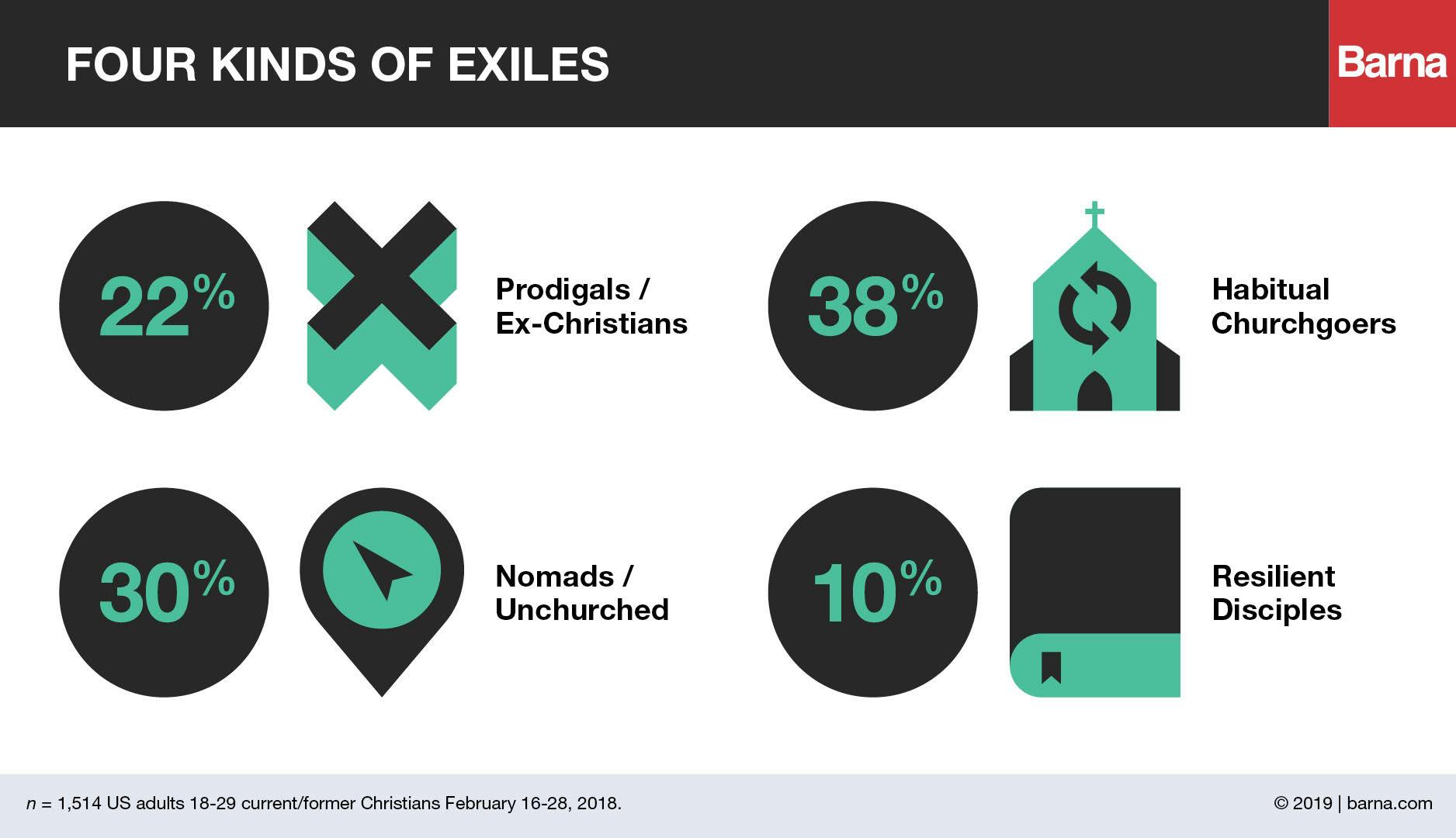What Do Young Adults Really Mean When They Say They Are Christians?

Through more than a decade of interviewing teens and young adults, Barna researchers have continued to encounter a small but significant number of young Christians who run counter to the overall church dropout trend. Using the same research parameters as in his 2011 book You Lost Me (18–29-year-olds with a Christian background), Barna president David Kinnaman and team dedicated a new study to learn more about this countertrend.
In Faith for Exiles: 5 Ways for a New Generation to Follow Jesus in Digital Babylon, Kinnaman and his coauthor, Mark Matlock, get to know the one in 10 young Christians whom they call “resilient disciples.” But they also take a look at three other paths chosen by young adults with a Christian background. Taken together, there are four kinds of twentysomething “exiles” making their way in our current day and age, which Kinnaman calls “digital Babylon.” Four exile groups reside in digital Babylon: prodigals, nomads, habitual churchgoers and resilient disciples.
When studying the one in 10 Christian twentysomethings who are resilient disciples, Kinnaman and Matlock identified five practices that help create and sustain resilience. This article will look deeper into the first practice: a transformational experience of Jesus. Data show that it’s easy for young adults to call themselves Christian—but it is much less common for them to find their identity in Jesus.
Few Christian Young Adults Find Their Identity in Jesus
Most Americans say they are Christians, but few follow that up with deep, heart-level, life-directing commitments. This is true of all generations, and it remains true of young adults in the U.S., two-thirds of whom identify as Christian.
In the segments defined for Faith for Exiles, nomads, habitual churchgoers and resilient disciples identify as Christian (100% each). Prodigals, on the other hand, usually consider themselves to be religiously unaffiliated. Additionally, the vast majority of resilient disciples and habitual churchgoers use phrases like “a Christian” or “a follower of Jesus” when describing their faith to other peoples. More than half of nomads, and even some prodigals also appear comfortable using these self-descriptions.
Simply calling oneself a Christian, however, may represent a very low bar. Resilient disciples are much more likely to also agree strongly with statements about Jesus that other Christian segments tend to reject, as outlined in the chart below. Nine out of 10 resilient disciples strongly agree that “living in a relationship with Jesus is the only way to find fulfillment in life,” that “my relationship with Jesus brings me deep joy and satisfaction” and that “following Jesus shapes my whole life: body, mind, heart and soul.” More than eight out of 10 resilient disciples firmly agree that “my relationship with Jesus impacts the way I live my everyday life.”
“What’s so remarkable about resilient disciples is that they truly exhibit a higher level of intimacy with Jesus than other young adults raised in the faith,” states Barna president David Kinnaman. “It’s heartbreaking to find that only about half of habitual churchgoers—young adults who attend church with regularity—strongly agree with the straightforward questions about Jesus.”
“How is it possible to show up week after week, year after year, without believing and experiencing Jesus more fully?” Kinnaman asks. “Habitual churchgoers should top the list of churches’ discipleship priorities; many of these young Christians are primed and ready for a deeper experience of (and commitment to) Christ.”
“It is easy to call oneself a Christian, but much less common to find deep joy in Jesus. That conclusion is where our first practice begins,” Kinnaman concludes. “The first practice of resilient discipleship in digital Babylon is clearing religious clutter to experience intimacy with Jesus.”
The data charts and excerpts in this article are from Faith for Exiles (2019), and were used by permission of David Kinnaman, Mark Matlock, and Baker Books, a division of Baker Publishing Group.
About the Research
The main research examination for theFaith for Exiles book was conducted with eighteen- to twenty-nine-year-olds who grew up as Christian. The charts and data shown in this article use data from qualitative interviews. The first includes data from a total of 1,296 US adults 18-29 who were current/former Christians. This data was collected online during January 2011 and the margin error for these respondents is +/- 2.7% at the 95% confidence level. The first and second chart both include data from a total of 1,514 US adults 18-29 who were current/former Christians that was collected online during February 16-28, 2018. The margin error for these respondents is +/- 2.3% at the 95% confidence level.
Photo by Bewakoof from Unsplash
© Barna Group, 2019
About Barna
Since 1984, Barna Group has conducted more than two million interviews over the course of thousands of studies and has become a go-to source for insights about faith, culture, leadership, vocation and generations. Barna is a private, non-partisan, for-profit organization.
Related Posts

Only 10% of Christian Twentysomethings Have Resilient Faith
- Faith
-
From the Archives
Lead with Insight
Strengthen your message, train your team and grow your church with cultural insights and practical resources, all in one place.
Get Barna in Your Inbox
Subscribe to Barna’s free newsletters for the latest data and insights to navigate today’s most complex issues.








